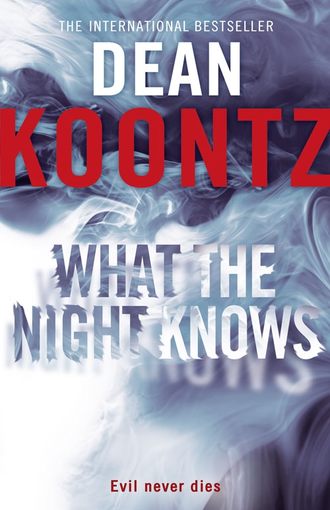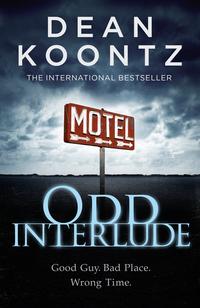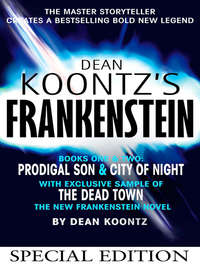
Полная версия
What the Night Knows
His hyperbolic suspicion embarrassed him, and more important, he recognized that if not controlled, it would cloud his judgment. If he permitted his imagination to paint a gloss of evil on all things, he would provide camouflage for true evil. Besides, if you painted the devil on the walls often enough, you got the devil on the stairs, his footsteps approaching.
When John allowed his children to delight him, they soon lifted from him this pall of foreboding.
After grace, during the salad course, the primary subject discussed was the brilliant, the magnificent, the incomparable, the current that’s-who-I-want-to-be-when-I-grow-up, Louisa May Alcott, immortal author of Little Women, which Naomi had finished reading just that afternoon. She wanted to be Louisa May Alcott, and she wanted also to be Jo, the young writer in the story, but of course she wanted to be herself, embodying all the Alcott-Jo qualities while writing and living in her unique Naomi style.
Naomi seemed destined, as an adult, to appear on Broadway in the title role of a revival of Peter Pan. She contained both a tomboy who yearned for swashbuckling adventures and a perpetually breathless girl who saw romance and magic everywhere she looked. She wanted to know how to throw a perfect sinking curveball every bit as much as she wanted to know how to arrange roses to the best effect, and she believed both in Truth and in Tinker Bell. As likely to dance along a hallway as to run it, more likely to sing away a sadness than to sulk, she exhausted the possibilities of each new enthusiasm just as inevitably another one came along to captivate her.
As Walter whisked away the salad plates, Zachary said, “Little Women sounds like a giant bore. Why can’t you go nuts about vampire novels like every other dorky sixth-grade girl? Then we’d really have something worth talking about at the table.”
“I don’t find the living dead the least bit attractive,” Naomi said. “When I’m old enough to have a boyfriend, I don’t want one who drinks my blood. Imagine his bad breath and what a mess his teeth would be. All these girls swooning over hunky vampires, what they really want is to give away their freedom, to be controlled and told what to do and not have to think – and never die, of course. It’s sick is what it is. I don’t want to be a forever-young living corpse, I want to be Louisa May Alcott.”
Minnie said, “It’s stupid how she has three names.”
“We all have three names,” Naomi said. “You’re Minette Eugenia Calvino.”
“But nobody calls me all three, like you guys said a thousand times already ‘Louisa May Alcott, Louisa May Alcott.’ It’s stupid.”
“Celebrity-shooters always have three names,” Zach said. “Like Mark David Chapman and Lee Harvey Oswald. There’s a bunch of others, but I can’t think of them right now.”
“Good,” his mother said. “I’d be very disturbed to have a thirteen-year-old son obsessed with three-name celebrity-shooters.”
“Zach is totally obsessed with the United States Marines,” Naomi said. “He’s got like eighty-six books about them.”
“I only have thirty-one books about them,” Zach protested, “and I’m not obsessed with the marines. I just like military history is all. Lots of people are interested in military history.”
“Relax,” Naomi said. “I wasn’t implying your interest in the marines is a homosexual thing. After all, you’re also obsessed with Laura Leigh Highsmith worse than you are the marines.”
“Three names,” Minnie observed.
John said, “Who’s Laura Leigh Highsmith?”
Minnie said, “Is she related to Louisa May Alcott?”
“She’s just a girl in my human-head class.”
The children were primarily home-schooled. For educational purposes, Naomi went out of the house only to music lessons and to junior-orchestra practices. Zach attended group lessons twice a week as part of an art-institute program for gifted children. Currently he was enrolled in a pencil class to learn the fine points of drawing the human head.
Teasingly, Naomi said, “Hey, does Laura Leigh Highsmith draw portraits of you?”
“She’s just a challenging subject,” Zach said. “Hard to get right. Other than that, she’s nobody.”
“Are you gonna marry her?” Minnie asked.
“Of course not,” Zach said. “Why would I marry a nobody?”
“What’s wrong with your face?” Minnie asked.
Naomi said, “It’s sure not sunburn. He’s blushing.”
“I’m not blushing,” Zach declared.
“Then it’s a bad rash,” Minnie said. “Mom, he’s got a bad rash.”
“Permission to leave the table,” Zach said.
John said, “Denied. You’ve eaten only a salad.”
“I’ve lost my appetite.”
“It’s the rash,” Minnie said. “Maybe it’s conflacious.”
“Contagious,” Naomi corrected.
Minnie said, “Permission to leave the table.”
“Why do you want to leave the table?” John asked.
“I don’t want no rash.”
“He’s drawn at least ten thousand portraits of Laura Leigh Highsmith,” Naomi revealed.
Zachary had inherited his mother’s talent – and his father’s grimace. “What’re you doing, snooping in my drawing tablets?”
“It’s not like reading a diary, for heaven’s sake. I like to look at your drawings, you’re so good, and I can’t draw for beans. Though if I was a good artist, I’d draw all kinds of things, variety, not a gazillion portraits of Laura Leigh Highsmith.”
“You always exaggerate everything,” Zach said. “First it’s ten thousand, now a gazillion.”
“Well,” said Naomi, “it’s at least a hundred.”
“A hundred’s a whole lot less than a gazillion.”
Nicolette said, “You’ve drawn a hundred portraits of the same girl, and this is the first I’ve heard of her?”
“That’s a really, really bad rash,” Minnie said.
For the main course, everyone but Minnie enjoyed the carbonata with polenta and vegetables. Walter served the girl spaghetti and meatballs because she had the culinary stubbornness of the average eight-year-old.
The conversation turned to Italian history, possibly because Naomi noted, rightly or wrongly, that the Chinese invented spaghetti, not the Italians, and Minnie wanted to know who invented meatballs, and to forestall any further diminishment of their Italian heritage, John invented a colorful story that placed the origin of meatballs squarely in Rome. They talked about Michelangelo lying on his back to paint frescoes on ceilings (according to Minnie, here was another guy with three names – Michael Ann Jello) and about Leonardo da Vinci inventing airships that would have flown if only the technology had existed to build them. Because there was no Italian front for the marines in World War I and because during World War II they served primarily in the Pacific theater, Zachary changed the subject to France in general and specifically to the Battle of Belleau Wood, one of the finest hours in the history of the Corps, while Naomi hummed “The Marine Hymn” and Minnie made surprisingly quiet machine-gun sounds to enhance her brother’s anecdotes of war.
For dessert they had lemon cake with layers of ricotta and chocolate. Minnie did not ask for vanilla ice cream instead.
The five of them washed, dried, and put away the dishes without breakage. Unthinkingly, Naomi pirouetted with a stack of clean salad plates, but catastrophe did not ensue.
Had they eaten earlier, there would have been games or contests or a story read aloud. But private time had arrived. Kisses, good-nights, and wishes for sweet dreams were exchanged, and suddenly John found himself alone, walking the ground floor to check that all the exterior doors were locked.
Standing in the dark at a front window, he watched the lamplit street bubble as if boiling. He had forgotten the rain, but it still fell, without pyrotechnics now, straight down in the windless night. The trees were flourished silhouettes, the yard black. The graceful arc of the porch, styled as an elongated temple portico, was crowded with shadows, but none of them moved or revealed a gleaming eye.
Chapter 12
Zach sat at his desk with his art tablet, reviewing recent drawings and wondering if he might be turning into a girl. Not the way the usual bonehead in a movie goes walking alone at night in a godforsaken forest where only the terminally stupid would go walking, and he gets bitten by some godawful thing and on the next full moon he morphs into the Wolfman, with no interest anymore in vegetables or cereal grains. If Zach was becoming a girl, it was a less dramatic transformation, slow and quiet, with no thrashing or snarling or howling at the moon.
His room was certainly not a girly room; it was a shrine to the Marine Corps. Crowding the walls were images of a present-day marine in dress blues with white gloves, an F/A-18 Hornet in flight, a supercool V-22 Osprey vertical-lift aircraft, the famous Iwo Jima flag-raising photo … Most striking of all was a print of Tom Lovell’s horrifying but thrilling painting of World War I marines attacking German troops in close combat in Belleau Wood: poisonous mist, gas masks, bloody bayonets, facial wounds …
If the marines would have him, Zach intended to be one of them eventually. Even if he was turning into a girl, they accepted girls in the marines now.
His dad’s parents had been art teachers, and his mom was a big deal in some quarters of the godawful art world. Zach’s talent had two origins, and he knew he ought to use it, but the question was What should he use it for? He didn’t want to teach art any more than he wanted to cut off his freaking ears and make a sandwich with them. You didn’t get to kick much butt teaching art. You didn’t get to blow up a lot of things for all the right reasons. And he would never care about what the freaking art-world snobs thought of him. His mom was the only non-idiot among her idiotic art-world friends. He wasn’t as nice as his mom, didn’t have her tolerance for snotty people, and he couldn’t always see the good side of them like she could. If he ever had his own godawful art-world friends, he would end up throwing them out ten-story windows and off overpasses, just to hear them splat.
Being an actual combat marine who, during lulls in the action, found moments to sketch scenes as they had been, as no photographer could ever catch those moments – that struck him as important work.
Other kids his age were big on sports stars and pop singers. These days, sports stars and pop singers were as real as steroids and lip-synching. Phonies. Fakes. Something had happened to the world. Everything was plastic. It wasn’t always that way.
Zach knew the names of marine combat artists the way other kids knew pop stars. Major Alex Raymond, who had become famous for his Flash Gordon comic strip. Pfc. Harry Jackson, who did great work at the Battle of Tarawa. Tom Lovell, John Thomason, Mike Leahy in Vietnam …
Zach’s determination to make a life in the Corps was almost two years old. For a long time, he didn’t give a thought as to why this enthusiasm gripped him, but lately he began to understand.
When he grew up, he didn’t want to do boring monkey work just for the bucks. He needed to be part of something where people cared about one another, would die for one another, where they set high standards, where they respected tradition, honor, truth. These were qualities of his family, and the way they lived – to their own rhythm, pursuing their enthusiasms with little interest in the fads of the day, with respect for one another that still left room for poking fun – was something he would need for the rest of his life because he was addicted to it. His family had addicted him to living with purpose and fun. When he became an adult, he wanted his working life to be as much as possible like life in the Calvino family.
And he wanted to be a marine also because of his sisters.
Naomi was hyper but smart, flighty but so talented, frustrating but funny, and sometimes she talked at you until it was like being caught in a flock of fluttering birds, nice bluebirds and canaries, but an infinite number of them, twittering forever. Life with her was often like tumbling through a humongous rotating barrel in an amusement park, but when you came out the other end and got your balance, you realized it was better to be in the barrel sometimes than to be stuck forever on some boring dumb-ass merry-go-round moving at like a tenth of a mile an hour with freaking organ music.
And as for Minnie – well, Minnie was Minnie. A couple years back, when Minnie came down with a mysterious illness nobody could diagnose for what seemed like forever but was probably just a week or so, Zach hadn’t been able to sleep well or draw well, or think well. Although he wasn’t sick like she was, he threw up twice, just because Minnie was sick, like a sympathy puke, though he didn’t tell anyone.
Bad things were going to happen to Naomi and Minnie because bad things happened to everyone. Zach wasn’t able to protect them from viruses and runaway trucks. But out in the wider world were a lot of evil men and insane dictators, and being a marine was a way to help protect his homeland, his home, his sisters, and their way of life.
Semper Fi.
He hoped he wasn’t turning into a girl, because he wanted to be their brother, not their sister. As he paged through recent drawings of Laura Leigh, he wondered about his gender because, although she was seriously pretty and though he had drawn her from observation and from memory more often than Michelangelo had drawn God, Jesus, saints, and angels combined, he felt no stirrings of desire for her.
Well, all right, now and then there were stirrings and a couple times the stirrings were so embarrassing that, to distract himself, he chewed on ice cubes until his teeth ached.
But maybe ninety-five percent of his obsession with Laura Leigh had nothing to do with sex. Mostly he felt about her the way he felt about his sisters, but even more so. She seemed so fragile, delicate, slender, so small and vulnerable that Zach worried about her, which struck him as weird because, although petite, she wasn’t a dwarf with brittle-bone disease, she was a normal size for a thirteen-year-old girl. He wanted to protect her, wanted her always to be happy, wanted everyone to see in her what he saw in her, not just beauty but also merit, virtue, kindness, and a precious something he couldn’t even name. His feelings for Laura Leigh were so tender and affectionate that they didn’t seem to be the kind of masculine things that a boy should be feeling. Sometimes the sight of her left him breathless, and sometimes when he was drawing her from memory, his throat grew so tight that he couldn’t swallow, and when at last he did swallow, though it was just spit, he sounded as if he were a pig taking down an entire apple. Surely only girls – and boys turning into girls – were swept away by their emotions like this.
He turned the tablet to a clean page, propped it on the slanted drawing board atop his desk, and took his pencils from a drawer. He intended to draw only Laura Leigh Highsmith’s nose. Her nose was a constant challenge to him because of its perfection.
After Zach sharpened his pencils and arranged them, before he began to commit carbon to paper, from the corner of his eye, he saw something move. He swiveled in his chair and sat watching the door to his closet swing slowly open.
Although the door had never done this before, no expectation of danger passed through Zach’s mind. He possessed a good imagination, but it didn’t lead him into bogeyman territory, either of the zombie-vampire-werewolf kind or of the guy-in-a-hockey-mask-with-a-chainsaw kind.
In real life, people who wanted to kill you were one of two varieties, the first being your freaking nutcase true believers who wanted to fly a plane through your window or get their hands on a nuclear weapon to blast you into bone dust. There was nothing you could do about them. They were like earthquakes or tornadoes to an ordinary citizen, so you had to leave them to the marines and not worry about them.
Then you had your everyday criminals who were motivated by envy or greed, or lust, or a desperate need for drugs. They looked so much like law-abiding citizens that more often than not they jammed the muzzle of a gun inside one of your nostrils and demanded your wallet or your booty before you realized they weren’t the kind who ever said “Have a nice day.”
Neither an al-Qaeda operative nor a convenience-store-robbing junkie could have found his way into Zach’s bedroom closet.
When the door drifted to a halt, all the way open, he got up and went to investigate the cause of its movement.
His walk-in closet was deeper than wide, with clothes hanging and shelved along the two longest walls. The overhead light glowed, though he felt certain that he had switched it off earlier.
Toward the back of the closet, a pull-ring on a rope dangled from a trapdoor in the ceiling, access to the crawlspace between the second and third floors. If you pulled the trap open, a wooden ladder unfolded from the back of it.
With the ladder down, a draft sometimes blew out of the space above and into the closet, strong enough to move the door if the latch hadn’t been engaged. But now the tightly fitted trap was closed, shutting off the only possible source of a draft.
They didn’t live in earthquake country, but like nearly every place on the planet, this city stood above at least one inactive fault. Although a minor temblor might be unlikely, it couldn’t be ruled out; however, he hadn’t felt the ground move.
Maybe the house had been settling. Houses did that. Maybe it slowly settled in such a way that the closet door no longer hung plumb. Then its own weight might pull it open if it wasn’t latched.
No other explanation presented itself. Case closed.
He switched off the light and stepped out of the closet.
Attached to the back of the door was a full-length mirror. Zach solemnly saluted himself, thinking of the day when on very special occasions he would wear dress blues and carry an officer’s Mameluke sword in a scabbard at his side.
As he closed the door, leaving the mirror to reflect only the dark closet, he listened to the latch click solidly in place. He was then overcome by a vague sense that something about his reflection, as he saluted, had not been right.
Maybe his salute or his at-attention posture had been sloppy. He had practiced them a lot when he was eleven, less when he was twelve, and lately not at all because when you were still years away from being a real marine, practicing such things too much seemed childish.
He returned to his chair at the desk, in front of the blank page of art paper, and picked up his pencil. He called forth the memory of Laura Leigh Highsmith’s singular and exquisite nose, and contemplated it with the hope of a sudden insight that would precisely define why it was so exquisite.
As far as he knew, there were no hairs in her goddess nose. He had never glimpsed any bristling from it, nor had he ever seen a ray of light catch a hair shape in the shadowy ovals encompassed by her porcelain-smooth nares. Of course he never walked right up to her and peered up her nostrils, so he couldn’t be sure they were in fact hairless.
“Idiot,” he said.
She was human, so of course she had hairs in her nose. She would die or something if she didn’t have hairs in her nose. Her nose might be as hairy inside as a freaking gorilla’s armpit. Hair or the lack of it had nothing to do with why her nose was a work of art beyond his talent to depict.
Hoping for inspiration, he set to work with his stupid pencil and the stupid blank sheet of paper. As slowly he drew, he thought of Laura Leigh, of course, but he also thought from time to time of the somehow-wrong reflection, and even though the latch had firmly engaged, he half expected the closet door to swing open again.
Chapter 13
Naomi had a walk-in closet like Zach’s but somewhat bigger, and on the back of the door hung a full-length mirror, a really splendid beveled-edge looking glass of such sparkling clarity that she half believed, when the stars were aligned properly, that the mirror might become a doorway between her world and a magical realm into which she could step and pursue fabulous adventures and her true destiny.
This world where she had lived for eleven years was magical, too, in so many ways, if a person was perspicacious enough to notice the numerous wonders of it. Perspicacious was her new favorite word. It meant “having keen insight,” an almost uncanny ability to see through – and to comprehend – what is dark and obscure. Unfortunately, there was a terrible shortage of perspicacity these days but veritable oceans of dark and obscure.
Anyway, this world was magical, but just not magical enough for Naomi’s taste. She yearned for wizards, flying horses, talking dogs, rainbows at midnight, and for things she could not even imagine, things that would leave her speechless and her heart swollen, not swollen in a bad way, like with disease or something, but swollen with awe and delight. If she ever had a chance to pass through a mirror or through a door that suddenly appeared in the trunk of a great oak tree, she would go – though of course she would have to take Minnie and Zach and her parents with her, and they were not as likely to want to go as she would be, so she might have to Taser them or something. They would be angry, but later they would thank her.
As she thought about perspicacity and magical realms and how a girl her age might obtain a Taser, Naomi tried on hats in front of the mirror, making several facial expressions under each one until she felt that with her face she reflected the character of the hat. This was an acting exercise she read about somewhere, and while she doubted she would ever be an actress, she definitely had not ruled out the possibility if, in the next few years, a magical door didn’t appear for her.
While Naomi mugged in front of the mirror, Minnie sat at her play table, building something with LEGO blocks. She was a whiz with LEGOS, she could build just about anything she wanted, but mostly she put together bizarre structures like nothing in the real world, some of them totally weird abstract shapes that ought to have collapsed but did not.
Naomi and Minette shared a room because in a world practically crawling with demented, drooling predators, Minette was too young and defenseless to sleep by herself even though Daddy set the perimeter alarm every night before bed. Besides, Minnie got scared sometimes and refused to be alone. Her fears were fraidy-cat stuff, nothing real, but of course she was still a child.
A brimless cloche hat with feather trimming on one side inspired Naomi to look mysterious and dangerous, as if she were a woman on a train between Paris and Istanbul, carrying priceless stolen diamonds in the lining of her suitcase. A blue straw hat with an open crown and a spotted veil said, I am chic, competent, and have no tolerance for nonsense. I will shoot you with the .32 pistol in my purse, step over your corpse, and mix for myself a positively divine martini.
Naomi had gotten her collection of hats at vintage-clothing stores while with her mother. Mother enjoyed browsing in such shops, though she never bought anything for herself other than an occasional piece of costume jewelry, which she never wore. She said recycled party and formal-occasion dresses were “hopes and dreams on hangers, moments from lives, delightful and intriguing and terribly sad at the same time.” Naomi couldn’t get her mind around delightful and terribly sad at the same time, but that was okay because gradually she acquired a fabulous collection of vintage hats.
When the strange thing happened, she was wearing a red straw hat with a narrow upturned brim, petersham band, and bow decoration. She thought the correct expression to match the hat ought to be comic or perhaps prim, but she couldn’t find it in her face. She was focused so completely on the hat and her face that the person passing behind her registered only as a quick dark shape that darted from right to left.







